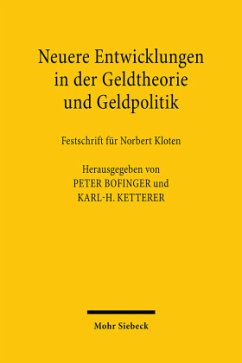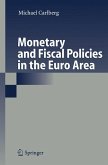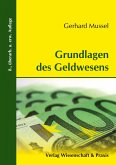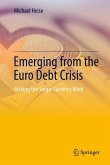Eine umfassende Darstellung des gesamten Gebietes von Geldpolitik und Geldtheorie. Die Autoren dieser Festschrift sind Experten auf dem Gebiet der Geldtheorie und prominente Notenbankpolitiker.
Aus dem Inhalt:
1. Grundfragen von Geldpolitik und Geldtheorie
2. Währungsordnung und Notenbankverfassung
3. Ziele und Konzeptionen der Geldpolitik
4. Geldangebot, geldpolitisches Instrumentarium und Zahlungsverkehrssysteme
5. Außenwirtschaftliche Aspekte der Geldpolitik und Europäische Integration
Recent Developments in Monetary Theory and Monetary Policy. Implications for the European Monetary Union. Festschrift for Norbert Kloten. Ed. by Peter Bofinger and Karl-Heinz Ketterer.
(Text in German)
This volume provides a comprehensive analysis of the main fields of monetary policy and monetary theory. Written by leading German experts in the field and by prominent members of the Deutsche Bundesbank, it deals with a variety of subjects such as rules versus discretion in monetary policy, the changing relationship between general policies and monetary policy, the monetary system and the central bank regulations, objectives and idea of monetary policy, money supply and monetary instruments, payment transaction systems, aspects of monetary policy in foreign trade and European integration.
Aus dem Inhalt:
1. Grundfragen von Geldpolitik und Geldtheorie
2. Währungsordnung und Notenbankverfassung
3. Ziele und Konzeptionen der Geldpolitik
4. Geldangebot, geldpolitisches Instrumentarium und Zahlungsverkehrssysteme
5. Außenwirtschaftliche Aspekte der Geldpolitik und Europäische Integration
Recent Developments in Monetary Theory and Monetary Policy. Implications for the European Monetary Union. Festschrift for Norbert Kloten. Ed. by Peter Bofinger and Karl-Heinz Ketterer.
(Text in German)
This volume provides a comprehensive analysis of the main fields of monetary policy and monetary theory. Written by leading German experts in the field and by prominent members of the Deutsche Bundesbank, it deals with a variety of subjects such as rules versus discretion in monetary policy, the changing relationship between general policies and monetary policy, the monetary system and the central bank regulations, objectives and idea of monetary policy, money supply and monetary instruments, payment transaction systems, aspects of monetary policy in foreign trade and European integration.






